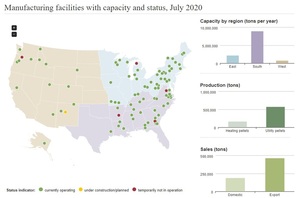Sununu vetoes bill to provide relief to Burgess BioPower
Energy Disrupter
ADVERTISEMENT
New Hampshire Gov. Chris Sununu on Aug. 18 vetoed HB 142, a bill that aims to support future operations at Burgess BioPower, a 75-megawatt (MW) biomass-fired power plant located in Berlin, New Hampshire. The company is evaluating the impacts of the veto and considering its next steps, said Sarah Boone, spokesperson for Burgess BioPower.
Information posted to the Burgess BioPower website explains that a clause in the facility’s power purchase agreement (PAA) is putting the facility’s future at risk. The PPA includes a mechanism referred to as the cumulative reduction factor (CRF), which compares the plant’s long-term fixed price against the fluctuating day-ahead market price and tracks any difference between the two.
Eversource, a New Hampshire electric utility, has a first right of refusal to purchase the Burgess facility at the end of the PPA. According to Burgess BioPower, the CRF total is essentially a lien on the property that offsets the purchase price. The CRF is capped at $100 million, but the balance is currently estimated at $170 million.
Burgess BioPower notes that whether the CRF balance is an accurate reflection of actual costs to ratepayers is questionable, as it compares the facility’s stable energy price against a market price consumers do not pay. Despite offering long-term price stability, power produced at the facility is not used as part of default service, the company explained. This means that consumers do not benefit from the plant’s fixed price when market prices skyrocket.
Currently, the balance over the CRF cap is set to be withheld from Burgess BioPower’s energy payments over a 12-month period, starting in December 2023. HB 142 would have provided relief by no longer requiring the company to replay that balance. Burgess BioPower stressed that the bill would not impose any new costs on ratepayers.
The New Hampshire House of Representatives voted 269 to 109 to pass HB 14 in March. The state’s Senate voted unanimously to pass the legislation in May.
In his Aug. 18 veto message, Sununu claimed the facility “has been enormously expensive for New Hampshire ratepayers” and “has received over $200 million in subsidies since 2014.”
The New Hampshire legislature could override Sununu’s veto. A veto override would require a two-thirds roll call vote in both houses of the legislature.
Burgess BioPower has expressed disappointment in the veto and said the company is evaluating its next steps.
“We are certainly disappointed in HB 142’s veto,” said Boone. “It creates a serious financial event for the company and the entire northern New Hampshire economy.
“The legislature got it right with this bill,” she continued. “From the 18-2 vote in favor of HB 142 in the House Science, Technology and Energy Committee, to nearly 70 percent of the House supporting the legislation and finally, to the unanimous vote in favor in the Senate, HB 142 represents a well-considered balancing of issues. The bill is the result of more than two years of collaborative, bipartisan work by legislators and the New Hampshire Department of Energy. HB 142 provides both a sustainable path forward for Burgess’s continued operation, while also ending ratepayer subsidies.
“At a time when New Hampshire and our regional grid operator are concerned about having enough power generation, losing the seventy megawatts Burgess provides will create a new set of challenges when it comes to meeting demand, especially during winter months,” Boone added.
“No one can predict future power prices,” she said. “At times this year, Burgess’s fixed price was significantly lower than the market rate. But Burgess’s story is not solely about cost. It is much more about value, when you consider the hundreds of jobs Burgess supports, its $70 million in annual economic benefits, and the reliable baseload energy it produces.
“The company is evaluating the impacts of the veto and considering our next steps,” Boone continued.
A full copy of HB 142 is available on the General Court of New Hampshire website.
















